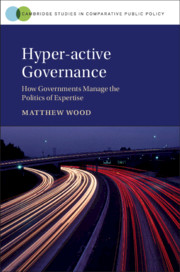Crossref Citations
This Book has been
cited by the following publications. This list is generated based on data provided by Crossref.
Stone, Diane
2019.
Making Global Policy.
Hinterleitner, Markus
2020.
Policy Controversies and Political Blame Games.
Trondal, Jarle
2020.
Europeisk integrasjon, offentlig forvaltning og statsvitenskapen.
Norsk statsvitenskapelig tidsskrift,
Vol. 36,
Issue. 1,
p.
34.
Trondal, Jarle
2020.
Public Administration and the Study of Political Order: Towards a Framework for Analysis.
Politics and Governance,
Vol. 8,
Issue. 4,
p.
120.
Trondal, Jarle
2022.
Flernivåstaten og krisehåndtering.
Nordisk Administrativt Tidsskrift,
Vol. 99,
Issue. 2,
Oliver, Kathryn
2022.
Integrating Science and Politics for Public Health.
p.
77.
Kwasi Tieku, Thomas
Trondal, Jarle
and
Gänzle, Stefan
2022.
The behavioural logics of international public servants: the case of African Union Commission staff.
Cambridge Review of International Affairs,
p.
1.
Nullmeier, Frank
2022.
Wie relevant ist die Politikwissenschaft?.
p.
311.
Wood, Matthew
Matthews, Felicity
Overman, Sjors
and
Schillemans, Thomas
2022.
Enacting Accountability Under Populist Pressures: Theorizing the Relationship Between Anti-Elite Rhetoric and Public Accountability.
Administration & Society,
Vol. 54,
Issue. 2,
p.
311.
Trondal, Jarle
2023.
Governing the Contemporary Administrative State.
p.
197.
Desatova, Petra
and
Alexander, Saowanee T
2023.
Election commissions and non-democratic outcomes: Thailand’s contentious 2019 election.
Politics,
Vol. 43,
Issue. 4,
p.
505.
Higdon, Nolan
2024.
Being on the Outside of the Inside of the Ivory Tower: Nontenured Part-Time Faculty’s Attitudes Toward Their Colleagues and Management.
Journal of Education Human Resources,
Vol. 42,
Issue. 2,
p.
175.
Elomäki, Anna
and
Haapala, Taru
2024.
Politics of expertise in the European Parliament: discursive constructions and contestations of expertise by party-political actors.
Journal of European Integration,
Vol. 46,
Issue. 3,
p.
321.





